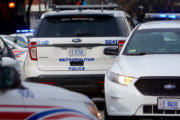WASHINGTON — “West Side Story” is nothing if not tragic.
But who is to blame?
“Jet Week” continues by determining who is at fault.
Poor Maria. In one night, she lost her big brother as well as her true love to needless street violence. In one fell swoop, an innocent young girl learned first-hand hate and the vicious cycle it spins. As with any tragedy of this magnitude, we have to ask ourselves who is to blame for the deaths of Riff, Bernado and Tony?
Sagging Economy. The U.S. Department of Labor reports the unemployment rate in New York City spiked 6.7 percent in 1961 (the year “West Side Story” was filmed and released). It was also the highest for the city between 1959 and 1976, not to mention 21.8 percent higher than 1960 and 1962. Teens are usually the first ones to lose their jobs during a recession and the last ones to regain them during a recovery. Some studies claim that unemployment moves in lock step with crime, and the “west side” of Manhattan was no economic oasis within the five boroughs.
Lack of Central Air Conditioning. I’m going to go out on a limb and suggest that the vast majority of families with kids in the Jets or Sharks at the time did not have central air conditioning in their homes. The summer of ’61 had 29 days of 90-degree heat or higher, 11 more than the average year in the Big Apple. Or should we say, boiling rotten apple…
Baseball Exodus. Not only did the kids have minimal economic opportunities during a blisteringly hot and disappointing summer, there were fewer options for entertainment as both National League teams — Brooklyn Dodgers and New York Giants — had both bolted for the west coast just a few years before. The Polo Grounds (just 6.1 miles away from where the movie is set on Amsterdam & 68th) lay fallow as the Mets would not arrive for another year. Yankee Stadium? The Bronx Bombers were far less progressive than their National League neighbors as the fourth to last Major League team to integrate. Not the kindest of venues for first or even second-generation American youths to spend their summer days enjoying “America’s pastime.”
Misinformation, Harassment and Police Procedure. What was Tony doing wandering around begging Chino (who was armed and looking for revenge) to come get him? Oh, yeah. Anita falsely told the Jets that Chino had killed Maria. Anita was going to do the right thing and tell Tony that Maria would be delayed, but on her way for them to escape the clutches of the city, the Jets opted to harass and assault her. Why couldn’t Maria get to Doc’s herself? She had to answer questions from Lt. Shrank regarding the incident at the gym, as he was investigating what looked like a double murder. But what caused the bloodshed?
Bad Advice. Okay, so you’ve got two warring gangs that are about to rumble. Chains, rocks, zip guns, knives — all is fair game. Or maybe the Jets and Sharks have been talked down to a fair fight: skin on skin. Phew, disaster averted. Or maybe not. Evidently somebody told Tony (a guy who doesn’t even want to really be in the Jets anymore) that he should stop the fight. He unwisely goes under the highway and invokes the anger of a protective brother. Sparks fly and Tony’s best friend, who always has his back, steps into the fray. After knife-on-knife combat, Tony tries to pull Riff back, only for the Jets’ leader to run straight into Bernardo’s knife. Tony avenges his fallen brother by stabbing Bernardo, and later that night, Chino avenges Bernardo. None of this would have happened had Tony not tried to stop the fight.
Verdict. Maria, you pleaded with Tony to stop the fight. You may feel pretty, but you also have to feel pretty guilty knowing what you set in motion. It’s Maria’s fault.








